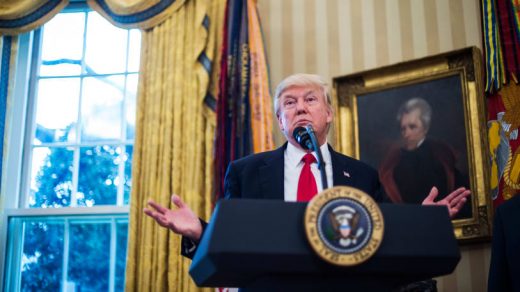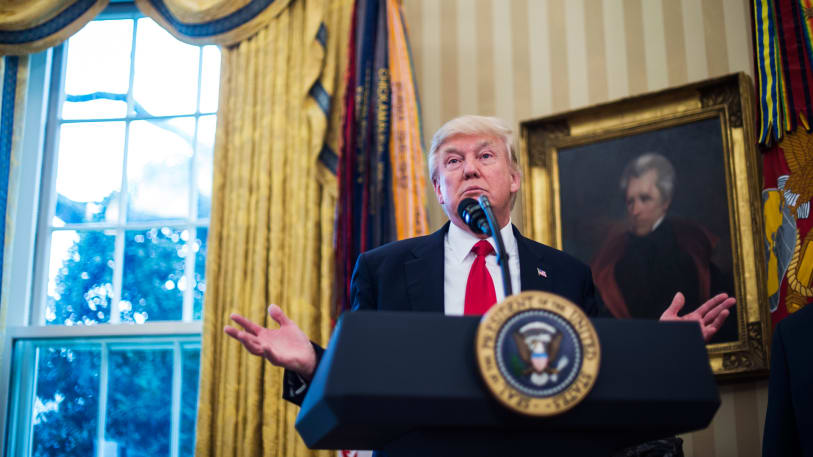What A Culture Of Leaks Says About Trump’s Leadership
Apart from the braggadocio and self aggrandizement we’ve come to expect, Trump’s latest boast about the classified intel he shared with Russian Foreign Minister Sergei Lavrov reaches into a national security danger zone. Of course, as the Washington Post report notes, a President has the authority to declassify information. But the implications of this latest round of communication calls into question the larger issue of the working culture that flourishes under a leader like Trump.
Although he’s never been professionally diagnosed as such, psychologist Dan McAdams did a thoughtful and lengthy exposition of Trump’s personality for The Atlantic that suggests he’s a narcissist. Such a personality is characterized, in part, by bragging (something Trump excels at).
In the workplace, corporate narcissism comes with an array of pros and cons. The upshot of narcissism can be a leader that’s viewed as visionary and charismatic. As Michael Maccoby observed in Harvard Business Review, “Today’s CEOs–superstars such as Bill Gates, Andy Grove, Steve Jobs, Jeff Bezos, and Jack Welch–hire their own publicists, write books, grant spontaneous interviews, and actively promote their personal philosophies.”
Yet as Maccoby notes, Freud shone a light on a narcissist’s dark side. Narcissists tend to emotionally isolated, highly distrustful, and rage against perceived threats. Achievements can feed feelings of grandiosity. (see this, or this, or this, or many of Trump’s other tweets).
Working For A Narcissist
Of course, a lack of trust in your boss isn’t exclusive to those working for Trump. The majority of the 33,000 people surveyed in Edelman’s “Trust Barometer” believe that their CEO was exhibiting unethical behavior. We’ve seen how leadership at Wells Fargo, Volkswagen, Uber, and others have all contributed to breeding corporate cultures that condoned unethical behaviors.
On the one hand, Trump’s administration is breeding a culture of leakers that surpasses anything we’ve seen during a presidential administration. As Jonah Goldberg, senior editor for the National Review, writes in the Chicago Tribune:
“After every meeting, participants race to their phones to put their anonymous spin on what happened. The reports read like parody. The Washington Post’s in-depth story on the Comey firing was based on the private accounts of more than 30 officials at the White House, the Justice Department, the FBI and on Capitol Hill, as well as Trump confidants and other senior Republicans.”
Goldberg chalks up part of the volume of leaks to the fact that not many who are working in the White House now have any prior experience working there which he says contributes to a “shocking lack of internal discipline and clear lines of authority.” Others may be doing it to save their credibility and careers if the whole administration takes a fall.
Alan Downs, a clinical psychologist and author of Beyond the Looking Glass, a book about corporate narcissism, believes that when a narcissist rises to leadership and earns the support of codependents, they may profess loyalty to the company but really only care about their own agendas. No matter how charismatic the leader, people eventually figure it out–and quit.
Maccoby finds that such leaders are rarely empathetic or emotionally intelligent. They aren’t into mentoring and are extremely competitive. Much of what we know about successful leadership is punctuated by the need to have soft skills to engage workers and make them loyal to their vision.
Experts offer advice for working with narcissistic bosses including stroking their ego and challenging them carefully. They also suggest staying on the boss’s good side–but know when enough is enough. Those who have bolstered Trump in the aftermath of his disclosures to the Russians haven’t exactly done this.
Dina Powell, a deputy national security adviser and H.R. McMaster, the national security adviser both called Russian leak story false. Steve Schmidt, a Republican consultant and former campaign manager for John McCain told Politico that they and others who’ve remained loyal to the President have had their credibility “completely shattered.” Schmidt said “Even people who have built up reputations for integrity over a lifetime of public service, they risk squandering it in this administration,” by “lying to the American people on issues big and small.”
Their loyalty to him and its potentially negative consequences probably isn’t causing Trump to lose much sleep. We’ve seen how he thrives on pitting people against each other. But how long can a culture of every man and woman for themselves really last?
A leader is only as successful as the team he helms. One who continues to demand loyalty, yet offers no compelling reason to give it would be ousted in the corporate world. Just look at what happened to Steve Jobs. But Jobs wasn’t the President of the United States. It’s imperative that the person who runs the most powerful institution in the world needs to inspire loyalty as well as offer the same to his reports, but he’s also obligated to prove that loyalty to the institution he’s temporarily steering in the world.
The implications of a boss who loves to brag.
Apart from the braggadocio and self aggrandizement we’ve come to expect, Trump’s latest boast about the classified intel he shared with Russian Foreign Minister Sergei Lavrov reaches into a national security danger zone. Of course, as the Washington Post report notes, a President has the authority to declassify information. But the implications of this latest round of communication calls into question the larger issue of the working culture that flourishes under a leader like Trump.
Fast Company , Read Full Story
(49)














